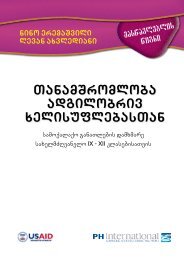The Geneva Protocol, by David Hunter Miller
The Geneva Protocol, by David Hunter Miller
The Geneva Protocol, by David Hunter Miller
You also want an ePaper? Increase the reach of your titles
YUMPU automatically turns print PDFs into web optimized ePapers that Google loves.
CHAPTER XV. 60<br />
refusing to settle its dispute with that Member (Covenant, Article 17, paragraph 3).<br />
Suppose at the time of the Corfu dispute, Italy had gone on {90} to war against Greece, and the British had<br />
deemed it their duty to apply an economic blockade against Italy.<br />
Suppose another case; suppose that Russia attacked Poland and that the British deemed it their duty to apply<br />
the economic blockade against Russia. We are speaking here in both of these cases merely of the provisions of<br />
the Covenant; and the question raised is what attitude might the United States take in such a case as one of<br />
these.<br />
I have suggested two instances for the reason that there is a slight difference between them. That difference<br />
lies in the fact that in the first instance supposed, Italy, as a Member of the League, would have agreed to the<br />
application of the sanctions; they would have been applied <strong>by</strong> the British as a result of Italy breaking her<br />
treaty. But in the second instance, Russia never having agreed to the Covenant, the sanctions would be applied<br />
<strong>by</strong> the British solely as a result of the British agreement to apply them and not because of any legal breach <strong>by</strong><br />
Russia, however morally wrong her attack on Poland might be.<br />
I do not think that the difference between the two supposed cases would make any difference legally in the<br />
attitude that the United States might take in the one case or the other. <strong>The</strong> blockade would arise from the<br />
provisions of the Covenant in either case. To that document the United States is not a party. In each case our<br />
correct legal position would be that our international rights were not limited <strong>by</strong> the agreement of others.<br />
Accordingly, let us consider the case of the blockade of Russia <strong>by</strong> the British, recalling that, under the<br />
hypothesis, Russia has attacked Poland and that the economic and financial blockade of the first paragraph of<br />
Article 16 of the Covenant has come into full force. Now, so far as that blockade cut off relations between<br />
Great Britain and Russia, it would be none of our business. But the language of Article 16 includes<br />
"the prevention of all financial, commercial or personal intercourse between the nationals (residents)[5] of the<br />
Covenant-breaking State (Russia, under the hypothesis; {91} see Covenant, Article 17) and the nationals<br />
(residents) of any other State, whether a Member of the League or not."<br />
What this would mean would be that all intercourse between Russia and the United States would be cut off <strong>by</strong><br />
the British Fleet so far as they could do it. <strong>The</strong> questions suggested are: Could the United States protest; and<br />
would we protest?<br />
<strong>The</strong> first question is a question of law. Would the United States have the right under international law to<br />
object to such a blockade? As a preliminary to the answer to this question, it must be pointed out that a<br />
blockade of Russia <strong>by</strong> the British might result in two different situations. Russia could undoubtedly regard<br />
such a blockade as being war, and if she did, no other country, neither the United States nor any other country,<br />
could then object to the blockade. <strong>The</strong> reason for that is that, without going into the much debated question as<br />
to the "legality" of war, under present international law it can at least be said that a neutral may not object to<br />
the belligerent status of two countries at war with each other. Of course a neutral may object to the manner of<br />
carrying on the war, or to particular incidents during the fighting; a neutral may protest that a particular<br />
blockade is not binding because not effective, and so on; but these things are not immediately important here.<br />
<strong>The</strong> important thing here is that if the blockade resulted in war, we could not object to the fact of war and its<br />
incidents.<br />
On the other hand, a blockade might continue merely as a blockade, without the technical status of war<br />
arising. This is, I suppose, not very likely in the case of the blockade of a Great Power, but still it is legally<br />
possible under the terms of the Covenant.<br />
<strong>The</strong> situation created would be new under international law. It would have to be considered as arising wholly
















